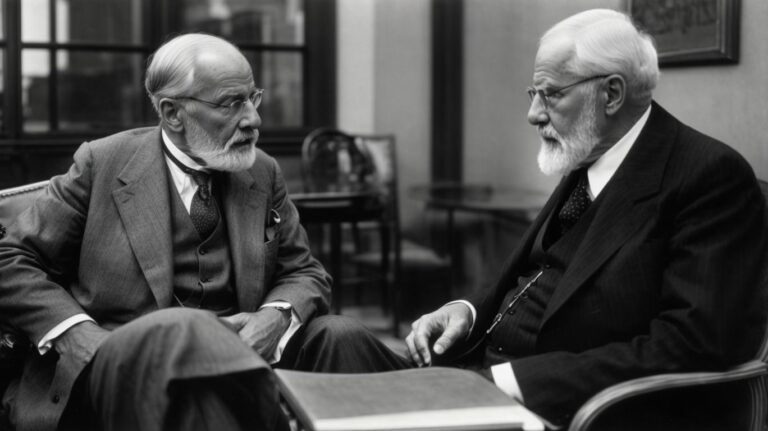William James, a prominent figure in the field of psychology, has made significant contributions that have shaped modern psychological theories and practices. From his development of functionalism and pragmatism to his exploration of the stream of consciousness, James’ work has had a lasting impact on the field. His influence can be seen in the development of new theories and approaches, as well as in the work of other psychologists who have been inspired by his ideas.
In this article, we will explore the legacy of William James in modern psychology, his notable works, and the continuing relevance of his ideas in the field.
Contents
- 1 Who is William James?
- 2 What is the Contributions of William James to Modern Psychology?
- 3 How Did William James Influence Modern Psychology?
- 4 What are Some of William James’ Most Notable Works?
- 5 What is the Legacy of William James in Modern Psychology?
- 6 Frequently Asked Questions
- 6.1 What is the influence of William James on modern psychology?
- 6.2 How did William James contribute to modern psychology?
- 6.3 What is functionalism in psychology and how is it related to William James?
- 6.4 How did William James’ ideas about consciousness influence modern psychology?
- 6.5 Can you give an example of how William James’ theories are still relevant in modern psychology?
- 6.6 What lasting impact has William James had on modern psychology?
Who is William James?
William James, known as the father of American psychology, was a prominent figure in the field of psychology and philosophy. He played a pivotal role in the development of pragmatism, a philosophical school of thought that emphasizes the practical consequences of beliefs and ideas. James was associated with Harvard College and made significant contributions to the understanding of consciousness and human behavior.
William James was born in New York City in 1842 into an intellectual family, with his father being a theologian and his brother, Henry James, a renowned novelist. His upbringing instilled in him a passion for academia and a curiosity about the workings of the human mind. James’ academic journey led him to study medicine at Harvard, where he later became an influential professor in psychology and philosophy.
His writings, including the groundbreaking ‘The Principles of Psychology,’ shaped the foundations of modern psychology and solidified his legacy as one of the most influential thinkers of his time. James’ association with Harvard allowed him to mentor and inspire generations of students, fostering a new wave of psychological and philosophical thinking.
What is the Contributions of William James to Modern Psychology?
William James made significant contributions to modern psychology through his pioneering work on consciousness, behavior, and emotions. He established a new school of thought that focused on understanding mental processes through empirical research and observation. James’s laboratory experiments challenged the prevailing structuralism of his time and promoted introspection as a method for studying human behavior.
James’s explorations into emotions were groundbreaking, especially with his emphasis on the importance of emotions in shaping behavior and cognition. He argued that emotions played a vital role in decision-making and problem-solving processes. His evolutionary theory influence, looking into how inherited traits and natural selection impact human behavior, expanded the scope of psychology.
His influence on the field’s methodology was profound, as he advocated for a more holistic approach that considered the whole person rather than just individual elements. James’s critique of structuralism paved the way for the development of functionalism, which focused on the functions and purposes of the mind rather than its structure.
Functionalism
William James’s functionalism proposed that mental activities serve a purpose in adapting to the environment. He believed that instincts influence behavior and that consciousness is a continuous process of adapting to stimuli. James’s theories laid the foundation for experimental psychology and emphasized the functional aspects of mental processes.
In James’s view, instincts play a crucial role as innate tendencies guiding behavior in response to environmental challenges. His concept of consciousness as an ongoing stream of experiences, flowing and changing with each moment, revolutionized the understanding of human cognition. Leveraging his functionalist perspective, psychologists have applied James’s insights to study adaptive functions such as problem-solving and decision-making in real-world situations. By investigating how mental processes help individuals adapt to their surroundings, researchers continue to uncover valuable insights into human behavior.
Pragmatism
William James’s pragmatism emphasized the importance of subjective feelings and practical consequences in philosophy.
He believed that our beliefs and ideas should be judged based on the practical outcomes they produce rather than on abstract theories. James viewed emotions as essential components of decision-making processes, influencing our actions and behaviors.
His collaboration with Carl Lange led to the formulation of the James-Lange theory of emotion, which posited that bodily changes preceded emotions, rather than the traditional view of emotions triggering bodily responses.
Pragmatism not only shaped philosophical discourse but also had a profound impact on psychology and education, emphasizing the importance of applying knowledge and concepts in real-world scenarios.
Stream of Consciousness
William James’s concept of the stream of consciousness revolutionized the understanding of perception and mental processes. He proposed that consciousness involves a continuous flow of thoughts and perceptions, influenced by physiological reactions and ongoing mental activities. James’s stream of consciousness theory challenged traditional views on the nature of conscious experience.
By emphasizing the interconnected nature of cognitive processes, James’s theory highlighted how sensory inputs, memories, emotions, and intentions intertwine to form a unified conscious experience. Through his work, James paved the way for modern psychology to delve deeper into the complexities of conscious awareness. His exploration of how our thoughts and feelings constantly evolve and interact resonates with contemporary research in neuroscience and cognitive psychology. This shift towards a dynamic, ever-changing view of consciousness has significantly influenced the study of human perception and behavior.
How Did William James Influence Modern Psychology?
William James influenced modern psychology through the development of innovative theories and approaches that reshaped the field. His ideas have left a lasting impact on psychologists who continue to draw inspiration from his work. James’s recognition as a pioneer in psychology underscores the enduring significance of his contributions.
One of William James’s most noteworthy contributions to psychology was his emphasis on the interconnectedness of mind and body, paving the way for a holistic approach that is now widely adopted in contemporary psychology. Through his novel theories on consciousness and the self, James challenged conventional beliefs and laid the foundation for modern psychological studies. His exploration of pragmatism as a philosophical framework also significantly influenced the way psychologists approach research and theories today.
James’s influence extended beyond his lifetime, with many prominent psychologists, such as Carl Jung and John Dewey, building upon his ideas to shape their own groundbreaking contributions to the field. The principles he established have become fundamental pillars of psychology, guiding researchers and practitioners in understanding human behavior and cognition.
Development of New Theories and Approaches
William James’s development of new theories and approaches in psychology, particularly in the areas of perception and evolutionary theory, significantly advanced the field. His insights into the functional aspects of consciousness function provided a fresh perspective on understanding human behavior.
James’s groundbreaking work paved the way for a more holistic approach to studying the complexities of the human mind. By integrating principles of evolution into his research, he revolutionized the field’s understanding of how behavioral patterns develop over time.
His emphasis on the practical consequences of mental processes added a pragmatic element to psychology, shifting the focus from abstract ideas to real-life applications. This shift in thinking influenced subsequent generations of psychologists, emphasizing the importance of exploring the relevance of psychological theories in everyday contexts.
Influence on Other Psychologists
William James’s influence on other psychologists, such as G. Stanley Hall and Charles Sanders Pierce, helped popularize American Pragmatism and fostered intellectual discussions at Harvard. His collaborative efforts and intellectual exchanges enriched the academic landscape of psychology.
The relationship between James and G. Stanley Hall, often hailed as the ‘Father of American Psychology,’ was of significant importance.
Through their interactions, they shaped the foundation of modern psychology in the United States. The intellectual dialogues between James and Charles Sanders Pierce, a renowned philosopher and logician, led to groundbreaking theories and methodologies that reshaped academic scholarship.
Impact on the Field of Psychology
William James’s impact on the field of psychology extended beyond his school of thought and laboratory research. His promotion of introspection as a method for studying behavior and emotions theory challenged traditional approaches, paving the way for new perspectives in psychological research.
James’s emphasis on introspection underscored the importance of inner experiences in understanding human behavior, opening up avenues for studying consciousness and subjective phenomena. Through his work, he highlighted the significance of individual differences and the role of context in shaping behavior, influencing future psychologists to explore these factors further.
What are Some of William James’ Most Notable Works?
Some of William James’s most notable works include ‘The Principles of Psychology,’ a groundbreaking text that laid the foundation for modern psychology. His ‘Varieties of Religious Experience’ and ‘Essays in Radical Empiricism’ further showcased his intellectual breadth and deep philosophical inquiries.
The Principles of Psychology, published in 1890, revolutionized the field with its emphasis on functionalism and introspection.
Varieties of Religious Experience delved into the nature of religious beliefs and their impact on human consciousness, while Essays in Radical Empiricism challenged traditional ideas of perception and reality. By blending psychology and philosophy, James became a pivotal figure in the development of pragmatism, influencing thinkers like John Dewey and Bertrand Russell. His exploration of consciousness, free will, and the nature of truth continues to shape contemporary debates in psychology and philosophy.
The Principles of Psychology
William James’s ‘The Principles of Psychology’ is a seminal work in the field, looking into experimental psychology, physiological reactions, and the role of instincts in shaping human behavior. This groundbreaking text revolutionized the study of psychology.
In ‘The Principles of Psychology,’ James delves deeply into the intricacies of human consciousness and behavior, exploring how our instincts drive much of our actions. By intertwining insights from philosophy, physiology, and psychology, James provided a comprehensive framework for understanding the complexities of the mind.
Through his observations on physiological reactions, James laid the foundation for the modern study of cognitive processes and emotional responses. He highlighted the interconnectedness of mind and body, emphasizing the holistic nature of human experience.
- James’s focus on experimental psychology paved the way for a more scientific approach to studying mental processes, challenging traditional philosophical views on the mind.
- The Principles of Psychology continues to influence contemporary research in fields such as neurobiology, cognitive science, and behavioral psychology, illustrating the enduring significance of James’s work.
The Varieties of Religious Experience
In ‘The Varieties of Religious Experience,’ William James delved into the realm of subjective feelings, emotional theories, and the intricate processes of consciousness. This work offered profound insights into the human experience of spirituality and belief.
James explored various forms of religious experiences, ranging from moments of intense ecstasy to profound despair, providing a comprehensive look at how individuals interpret and respond to the divine.
He emphasized the importance of personal interpretation and individual growth in spirituality, challenging traditional notions of organized religion and proposing a more fluid understanding of faith.
The Varieties of Religious Experience sparked discussions on the role of psychology in understanding religious phenomena, influencing subsequent studies on the intersection of faith and psychology.
Essays in Radical Empiricism
William James’s ‘Essays in Radical Empiricism’ delved into the depths of mental activities, philosophical inquiries, and the functional aspects of consciousness. This collection of essays offered profound reflections on the nature of human cognition and experience.
James’s exploration into radical empiricism paved the way for a deeper understanding of how sensory experiences and intellectual processes shape our understanding of the world. By emphasizing the importance of direct experience and immediate sensations, these essays highlighted the intricate interplay between perception and interpretation. Through his philosophical musings, James challenged conventional notions of reality and pushed the boundaries of empirical inquiries, urging readers to reconsider the fundamental nature of consciousness and reality.
What is the Legacy of William James in Modern Psychology?
William James’s legacy in modern psychology is marked by his profound influence on education, philosophy, and the continuation of his ideas and theories. He is widely recognized as a pioneer in psychology, with his innovative frameworks enduring as foundational pillars of psychological inquiry.
James, known for his groundbreaking work in pragmatism and functionalism, revolutionized the way psychologists approach human behavior and cognition. His concept of stream of consciousness laid the groundwork for modern-day cognitive psychology, emphasizing the subjective experience of individuals.
- William James not only contributed significantly to the understanding of mental processes but also advanced the philosophical underpinnings of psychology, bridging the gap between science and philosophy.
Influence on Education and Philosophy
William James‘s influence on education and philosophy extended from academic institutions like Harvard College to intellectual circles in New York City and Newport, Rhode Island. His legacy in shaping educational paradigms and philosophical discourse remains influential to this day.
William James’s exploration of pragmatism and the psychology of education revolutionized thinking in academic and philosophical realms alike. His emphasis on experiential learning and the practical application of knowledge challenged traditional pedagogical approaches, leading to a more student-centered educational system.
James’s lectures at Harvard College captured the attention of aspiring intellectuals, sparking discussions that rippled through New York City and Newport, Rhode Island. His ideas on free will, consciousness, and the nature of truth continue to fuel philosophical debates and inspire educational reform.
Continuation of His Ideas and Theories
The continuation of William James’s ideas and theories can be seen in the intellectual currents that flowed through figures like Louis Agassiz, Wundt, and Darwin. His conceptual legacy navigates the scholarly landscape like the Amazon River, influencing generations of thinkers.
Through the lens of William James’s pioneering work, scholars such as Louis Agassiz, Wundt, and Darwin were able to delve deeper into the realms of psychology, biology, and philosophy, reshaping their respective fields. The impact of James’s theories reverberates across time, continuing to inspire and challenge modern-day researchers and academics. Like the Amazon River, James’s concepts flow seamlessly through different disciplines, providing a rich source of intellectual nourishment for those seeking to understand the complexities of human consciousness and behavior.
Recognition as a Pioneer in Psychology
William James’s recognition as a pioneer in psychology transcends national boundaries, with his influence resonating in the works of European, German, and French thinkers.
James’s groundbreaking ideas revolutionized the way psychologists approach human behavior, shifting the focus towards functionalism and the study of how mental processes assist individuals in adapting to their environment.
His emphasis on the examination of consciousness and the exploration of human instincts paved the way for a deeper understanding of the complexities of the mind.
Not only did James’s work shape the foundation of psychology in America, but it also had a profound impact on the development of psychological thought across the Atlantic, inspiring a new generation of scholars in Europe.
Frequently Asked Questions
What is the influence of William James on modern psychology?
William James was a pioneering figure in psychology, and his work has had a significant impact on the field of modern psychology. His ideas and theories have influenced many aspects of psychology, including the study of consciousness, emotion, and behavior.
How did William James contribute to modern psychology?
William James’ contributions to modern psychology include the development of functionalism, which focused on understanding the purpose and function of mental processes. He also emphasized the importance of studying individual experiences and subjective perspectives in psychology.
Functionalism is a psychological approach developed by William James, which focused on understanding the purpose and function of mental processes. James believed that psychology should study how individuals adapt to their environment, rather than just focusing on the structure of the mind.
How did William James’ ideas about consciousness influence modern psychology?
William James’ ideas about consciousness played a significant role in shaping modern psychology. His concepts of stream of consciousness and the varying levels of awareness have become fundamental aspects of how we understand and study consciousness today.
Can you give an example of how William James’ theories are still relevant in modern psychology?
One example of William James’ enduring influence is his theory on emotions, which proposed that physiological changes precede emotional experiences. This idea is still widely accepted in modern psychology and has formed the basis for further research on the relationship between emotions and the body.
What lasting impact has William James had on modern psychology?
William James’ influence on modern psychology can be seen in various areas such as the study of consciousness, emotions, behavior, and individual experiences. His ideas and theories have laid the foundation for many of the principles and approaches used in contemporary psychological research and practice.




